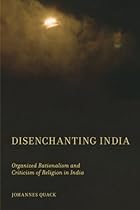Disenchanting India: Organized Rationalism and Criticism of Religion in India

| Author | : | |
| Rating | : | 4.74 (916 Votes) |
| Asin | : | 0199812624 |
| Format Type | : | paperback |
| Number of Pages | : | 380 Pages |
| Publish Date | : | 2014-06-06 |
| Language | : | English |
DESCRIPTION:
Johannes Quack studied Religious Studies, Philosophy, and Anthropology at the Universities of Bayreuth, Edinburgh, and Heidelberg. He was a Postdoctoral Fellow at the Cluster of Excellence "Asia & Europe," Heidelberg University and is currently research fellow at McGill University, Montreal.
"Excellent" according to Vishnu Menon. Excellent book that explains the history of secular and scientific thought in India.. Atheism and humanism , freethought and free thinking Darth Vindex (A.V.S) Free thinking is known commonly as UFO - ET Conspiracy Research. It has always been known as that and has thus been furiously opposed by 'pseudo free thinkers'who can't hear this kind of research named because they consider themselves to be 'such free thinkers' that they don't need to hear it. Because fundamentalist Christianity and fundamentalist Islam opposed UFO - ET Conspiracy Research in the 20th Century , Atheist and 'Critical Thinker' Organizations felt it easy to behave like fundamentalist Islamists , fundamentalist Christians and other extremist materialists to make it look like the
Disenchanting India is a major contribution to and entry point for the study of complex and long-standing problems of Indian society."--H-Net Reviews. He has combined ethnographic analysis, social theory, and a deep knowledge of Indian history with reflections on secularism, religious belief, rationality, enchantment, and disenchantment. "Johannes Quack has ventured into new territory in his close study of the Indian rationalist movement, particularly its manifestations in early twenty-first century Maharashtra. Smith, Professor of Sanskrit and Classical Indian Religions, University of Iowa"The book is a rich source of informationIt provides the reader with food for thought on complex questionsThe narrative is engaging and full of ethnographic detail about personal dilemmas, doctrinal conicts, and rationalist performances. This excellent volume must be examined b
Johannes Quack challenges this representation through an examination of the contemporary Indian rationalist movement, which affirms the values and attitudes of atheism, humanism, or free-thinking. Quack also shows the role played by rationalism in their day-to-day lives, as well as the organization's controversial position within Indian society. Quack shows the rationalists' emphasis on maintaining links to atheism and materialism in ancient India and outlines their strong ties to the intellectual currents of modern European history. India is frequently represented as the quintessential land of religion. At the heart of Disenchanting India lies an ethnographic study of the organization "Andhashraddha Nirmulan Samiti" (Organization for the Eradication of Superstition), based in the Indian State of Maha
